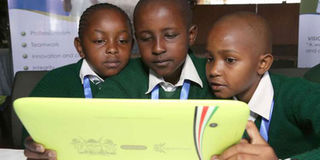This is how to achieve education for all

Mbagathi Road Primary School pupils use government provided electronic gadget to study during National Conference of Curriculum Reform on March 30, 2016 at Kenyatta International Convention Centre. PHOTO | JEFF ANGOTE | NATION MEDIA GROUP
What you need to know:
- The right to education should be exercised with the full understanding that education facilitates overall human development.
- Kenya’s educational planners and policy implementers have the chance to craft a regional service-oriented economy based on educational excellence.
- It is important for the government to invest in public social service delivery so that parents are weaned-off worries about individual survival.
Formal education as widely appreciated in the country’s development framework is closely linked to early imperialist enlightenment and Christian missionary work. Achievements realised by the missionary educators revolutionised our literacy culture.
The result is that learner performance in national examinations is now seen as a signal of success in life for the candidates. But this is not what education ought to be in the 21st Century.
This year, an estimated one million young Kenyans will enrol for KCPE, but less than a half of that number will continue with school next year.
About a third of the pupils flatly fail to continue with any formal schooling because they flunk examinations or their parents are unable to support them due to sheer poverty. What reasons can we offer for this regrettable state of affairs?
Education is a leveller. In Many Kenyan schools, the institutional mantra is simply ‘Education is the Key.’ With gaping economic inequalities in the country, poverty and a weak distribution of development benefits, excellent educational performance is still a sure way out of squalor.
The right to education should be exercised with the full understanding that education facilitates overall human development and, in a sense, other human rights cannot amount to much if the population is illiterate and uninformed.
People can improve their living standards and integrate the society towards more collective goals when they have developed the needed skills.
The outcomes of an educated decision are better informed and promote societal dignity.
In part, this is the basis for most of the developed countries investing heavily in education. In countries like Singapore, Germany, Japan, Scandinavia and Malaysia, state investment in public education has been tremendous.
Kenya’s educational planners and policy implementers still have the chance to craft a regional service-oriented economy based on educational excellence. This is why schools fees ought to be affordable as a crucial step to solving barriers to access education.
BASIC EDUCATION
In my opinion, the revamped Constituency Development Fund for nationally-aligned projects should do more to support public educational infrastructure, particularly at the elementary level, in line with this philosophy. We also have a unique chance to significantly augment bursaries.
The crux of this dilemma is, however, pinned on the hopes of the individual parent. It is important for the government to invest in public social service delivery so that parents are weaned-off worries about individual survival.
The state is progressively anchoring programs to entitle all to basic education. Philanthropists — corporates and individuals — are founding and enhancing schemes to sponsor poor, bright kids. The government is also gradually rolling out vocational training institutes. We are moving, but we must do more. Compassion and egalitarianism are virtues that glow and grow the heart and the pocket simultaneously. Those of us who can, let’s do more.
When public hospitals work and businesses can be established and grow predictably, when pensions and health insurance for our senior citizens function without difficulties, and things like public transport are sorted out, individual insecurities will shrink and collective public good will flourish.
With time, the rat race to further dreams of insecure villages and parents will wane, making the country’s educational objectives sustainable and innovative.
It is the future we should aspire for.
The Writer is the MP for Mukurweini and the national coordinator, BORESHA Katiba parliamentary initiative to amend the Constitution to save public expenses and reduce duplicitous governance




